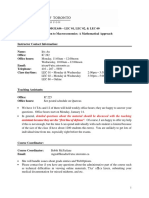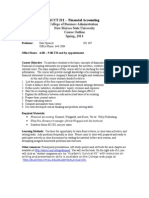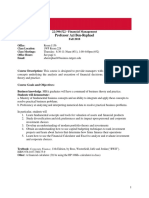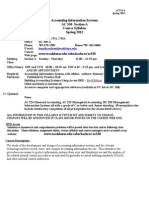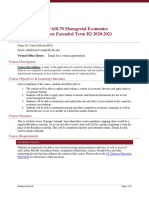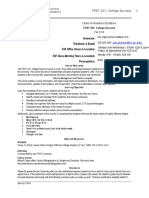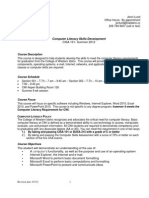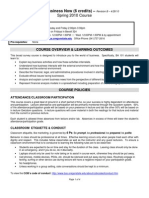0 ratings0% found this document useful (0 votes)
103 viewsSyllabus Ecn204 F12
Syllabus Ecn204 F12
Uploaded by
RobMagooThis is the second course in the Introductory Economics sequence that focuses on
Macroeconomics. Macroeconomics is the study of how national economies behave. This course
considers the determinants of national income, employment and prices. It examines business
cycle, the factors affecting economic growth and international trade. It also includes a critical
analysis of monetary and fiscal policies designed to achieve the established goals.
In doing this, we will first discuss how a country’s “economic activity” is measured, and
then develop models of how this economic activity is determined. Some of the lectures will be
descriptive, relying on plane geometry and intermediate algebra (high school level); the ability
to understand and use diagrams is extremely desirable.
Copyright:
© All Rights Reserved
Available Formats
Download as PDF, TXT or read online from Scribd
Syllabus Ecn204 F12
Syllabus Ecn204 F12
Uploaded by
RobMagoo0 ratings0% found this document useful (0 votes)
103 views5 pagesThis is the second course in the Introductory Economics sequence that focuses on
Macroeconomics. Macroeconomics is the study of how national economies behave. This course
considers the determinants of national income, employment and prices. It examines business
cycle, the factors affecting economic growth and international trade. It also includes a critical
analysis of monetary and fiscal policies designed to achieve the established goals.
In doing this, we will first discuss how a country’s “economic activity” is measured, and
then develop models of how this economic activity is determined. Some of the lectures will be
descriptive, relying on plane geometry and intermediate algebra (high school level); the ability
to understand and use diagrams is extremely desirable.
Original Title
Syllabus_ecn204_F12
Copyright
© © All Rights Reserved
Available Formats
PDF, TXT or read online from Scribd
Share this document
Did you find this document useful?
Is this content inappropriate?
This is the second course in the Introductory Economics sequence that focuses on
Macroeconomics. Macroeconomics is the study of how national economies behave. This course
considers the determinants of national income, employment and prices. It examines business
cycle, the factors affecting economic growth and international trade. It also includes a critical
analysis of monetary and fiscal policies designed to achieve the established goals.
In doing this, we will first discuss how a country’s “economic activity” is measured, and
then develop models of how this economic activity is determined. Some of the lectures will be
descriptive, relying on plane geometry and intermediate algebra (high school level); the ability
to understand and use diagrams is extremely desirable.
Copyright:
© All Rights Reserved
Available Formats
Download as PDF, TXT or read online from Scribd
Download as pdf or txt
0 ratings0% found this document useful (0 votes)
103 views5 pagesSyllabus Ecn204 F12
Syllabus Ecn204 F12
Uploaded by
RobMagooThis is the second course in the Introductory Economics sequence that focuses on
Macroeconomics. Macroeconomics is the study of how national economies behave. This course
considers the determinants of national income, employment and prices. It examines business
cycle, the factors affecting economic growth and international trade. It also includes a critical
analysis of monetary and fiscal policies designed to achieve the established goals.
In doing this, we will first discuss how a country’s “economic activity” is measured, and
then develop models of how this economic activity is determined. Some of the lectures will be
descriptive, relying on plane geometry and intermediate algebra (high school level); the ability
to understand and use diagrams is extremely desirable.
Copyright:
© All Rights Reserved
Available Formats
Download as PDF, TXT or read online from Scribd
Download as pdf or txt
You are on page 1of 5
Department of Economics Faculty of Arts
Ryerson University Fall 2012
Page 1 of 5
ECN 204 INTRODUCTORY MACROECONOMICS
Professional Related Course
Anti-Requisites: ECN 210 and FMG 905
Contact Information
Instructor: Dr. Christos Shiamptanis
Office: JOR 225
Office Hours: Tuesdays and Thursdays 1:10pm 2:00pm
Phone: 416-979-5000 extension 3004
Email: christos.shiamptanis@ryerson.ca (write ECN 204 in the subject box)
Lecture: Tuesdays, 10:10am - 1:00pm in AMC 003
Blackboard: my.ryerson.ca
Course Description
This is the second course in the Introductory Economics sequence that focuses on
Macroeconomics. Macroeconomics is the study of how national economies behave. This course
considers the determinants of national income, employment and prices. It examines business
cycle, the factors affecting economic growth and international trade. It also includes a critical
analysis of monetary and fiscal policies designed to achieve the established goals.
In doing this, we will first discuss how a countrys economic activity is measured, and
then develop models of how this economic activity is determined. Some of the lectures will be
descriptive, relying on plane geometry and intermediate algebra (high school level); the ability
to understand and use diagrams is extremely desirable.
Course Materials
The following are required for this course:
1. Principles of Macroeconomics textbook by Mankiw, Kneebone, McKenzie, 5
th
Canadian edition, 2011, Nelson.
The following are highly recommended for this course:
1. Study Guide by Fortura and Manouchehri.
2. Online assessment program called Aplia. (Aplia is an integrated internet system
that allows you to complete and submit your assignments online. In order to
access Aplia, each student must set up an individual account)
The Study Guide and Aplia should be used to help you understand the topics in
the textbook and to prepare for examinations.
The bookstore will buddle the textbook together with the Study Guide and the Aplia
access code in a special package. It should be selling for about $128.95.
A Blackboard site has been also created for this course. To access the site, go to
my.ryerson.ca. After you log-in, click on ECN 204 Introductory Macroeconomics. The web-site
includes the course outline, lecture notes and attendance quizzes. Students are encouraged to
access this site on a regular basis, as communication in the course will be undertaken in this
manner. It is strongly recommended that you check it frequently for important
announcements.
Department of Economics Faculty of Arts
Ryerson University Fall 2012
Page 2 of 5
Course Evaluation
Attendance Extra 5% Every Class
Midterm exam 40% October 23, 2012
Final exam 60% TBA
Attendance:
Attendance is not mandatory. But students who attend all classes can receive up to 5
extra-credit points towards their final grade. Put differently, students will be rewarded for
attending classes. Please note that this is the only way to get extra credit in this course.
Every class you will be given a password. Students will need the password to access
Blackboard and answer a couple of questions relating to that days material. Please note that
the password will be given only once in class. The password will never be emailed or posted in
Blackboard. Students will have almost one week to answer all the questions. Students that
arrive late or leave during class or are otherwise disruptive and do not hear the correct
password, will be considered absent. Students that forget to answer the questions or miss all
the questions will be considered absent. Students who are unable to complete the questions
for any reason will be considered absent. Past experience indicates that there is positive
correlation between attendance and success in the course.
Assignments:
Assignments are not mandatory, but they are highly recommended. There will be five e-
assignments. The e-assignments can be completed online using Aplia. The sole purpose of the
assignments is to better prepare you for the exams. They will have a deadline, and all students
are highly recommended to complete them by the due date. Past experience indicates that
there is a strong positive correlation between assignments and success in the course.
Exams:
The midterm exam is worth 40% of your grade. It will consist of multiple choice
questions. The midterm will cover material from the first day of classes. It should be taken by all
students at the scheduled date.
The final exam is worth 60% of your grade and is comprehensive. It will consist of multiple
choice questions. The final exam should be taken by all students at the scheduled date.
Writing Center/English Language Support:
Students who feel that their language skills need to be improved should visit the Writing
Centre at Ryerson (LIB 272B, http://www.ryerson.ca/writingcentre). The Centre offers a series
of workshops and other tools to help students improve their writing/verbal skills.
For students whose first language is not English the English Language Support
(http://www.ryerson.ca/studentservices/els/) offers task-based academic language workshops,
individual help with written assignments, one-on-one conversation and pronunciation practice,
as well as help with reading listening and oral presentations.
Math Assistance Centre
Department of Economics Faculty of Arts
Ryerson University Fall 2012
Page 3 of 5
The Math Assistance Centre (LIB-549, http://www.ryerson.ca/mac/) is there to support
students across campus with their math skills and math-related courses. The Centre currently
offers individual tutoring, as well as running Facilitated Study (FA-ST) groups.
Examination Policy
No permission is ever given to a student to write a midterm test or final exam in
advance of its date.
A student who misses an exam can write a make-up exam if both of the following
conditions are met:
o The student notifies the instructor via e-mail and before the date and time that
the exam will be missed.
o The student submits a Ryerson University Student Medical Certificate
(www.ryerson.ca/senate/forms/medical.pdf) to the instructor or Undergraduate
Program Administrator (Neha Narang) within 3 business days of missed or
affected exam.
Students who do not write the midterm test or final exam and fail to meet both criteria
receive a zero grade for that course component.
The make-up exam should be written within 10 business days at the Access Centre.
There is no make-up of a make-up exam!
Despite the severity of the issue, there are absolutely no exceptions to the above
policies.
Religious Observance Policy
If a student wishes to reschedule a midterm or a final exam due to religious observance,
it is the students responsibility to contact the instructor, via e-mail at least two weeks in
advance.
To arrange an alternative date or time for a final exam scheduled in the formal period,
students must complete an exam accommodation form which can be obtained on
www.ryerson.ca/currentstudents/forms/. The religious observance policy designed by senate
can be found at www.ryerson.ca/senate/policies/pol150.pdf.
Exceptional circumstances
If unforeseen circumstances arise that can potentially affect a students performance in
the course (financial distress, health issues, family problems) the student must inform the
professor as soon as possible. Failure to raise the issue in a timely matter could affect the
ability to successfully appeal a course grade.
Course Management Policy
Students are expected to be familiar with all Senate policies regarding course
management and academic conduct. These policies can be found on the Senates webpage:
www.ryerson.ca/senate/policies. In particular, students should familiarize themselves with at
least the following policies:
Code of Conduct and Academic Dishonesty
Department of Economics Faculty of Arts
Ryerson University Fall 2012
Page 4 of 5
Students are expected to abide by the Code of Conduct which can be found on
www.ryerson.ca/senate/student. Particular attention should be placed on the sections dealing
with academic dishonesty.
Lecture and Test Rules
Students should check Blackboard regularly for announcements.
Students should silence all cell phones before entering the lecture hall.
Laptops are allowed only for taking notes. If you use them to surf the internet, then you
will lose the privilege to use them again in the future.
During all exams: scientific calculators, financial calculators, digital dictionaries, PDAs,
cell phones and other electronic devices are not allowed. Books, papers, knapsacks,
briefcases, purses, hats, and coats stay at the front or side of the lecture hall. The only
items that you may have with you are pens, pencils, basic function calculator, and
identification. If you do not follow these rules you may be charged with academic
dishonesty.
Grade Appeal Policy
If a student thinks that there has been an error in the recording or calculation of a grade,
he/she should follow these steps:
Talk to the professor within 10 business days after the graded work is returned.
If the student cannot resolve the issue with the professor, the student can make a
formal request for a grade revision, in writing, to the Undergraduate Program Director
(Dr. Claustre Bajona). Formal requests for grade revisions should be filed BEFORE the
appeals deadline. Semester-specific appeal deadlines can be found in the Ryerson
Calendar under Significant Dates.
Students, who request re-grading of their work, should be aware that as a result of the
reassessment their grade could increase, decrease, or remain the same. The grade
determined after the reassessment will be the students final grade.
The Academic Consideration and Appeals Policy, which establishes the guidelines for
formal appeals, can be found at www.ryerson.ca/senate/policies/pol134.pdf.
GRADE APPEALS OR REGRADING REQUESTS FILED AFTER THE APPEALS DEADLINE WILL
NOT BE ACCEPTED.
Course Outline
Week Topic Chapter
1 and 2 Introduction Chapters: 1, 2, 4
3 The Data for Macroeconomics Chapters: 5, 6
4 Economic Growth Chapters: 7
Department of Economics Faculty of Arts
Ryerson University Fall 2012
Page 5 of 5
5 Saving, Investment, and the Financial System Chapters: 8
6 Study Break
7 Unemployment Chapters: 9
8 Midterm Exam (Chapters: 1, 2, 4, 5, 6, 7, 8, 9)
9 Monetary Policy Chapters: 10, 11
10 Open-Economy Macroeconomics Chapters: 12, 13
11 Aggregate Demand and Aggregate Supply Chapters: 14
12 Monetary and Fiscal Policy, and Aggregate Demand Chapters: 15
13 Macroeconomic Policy Chapters: 17
Note: Portions of some of the chapters may be skipped, and other material may be added.
You might also like
- Digital SAT Preview: What to Expect + Tips and StrategiesFrom EverandDigital SAT Preview: What to Expect + Tips and StrategiesRating: 5 out of 5 stars5/5 (3)
- Wickert 4e SI ISM FMDocument6 pagesWickert 4e SI ISM FMpropone0% (1)
- Grade 11 English TextbooksDocument3 pagesGrade 11 English TextbooksSteve83% (23)
- DLL-Template 2023Document14 pagesDLL-Template 2023Datu Donnavie100% (2)
- Syllabus Acc 101-503, 504Document4 pagesSyllabus Acc 101-503, 504alb3rtlinNo ratings yet
- Rsm321 Course Outline Fall 2020Document11 pagesRsm321 Course Outline Fall 2020Michelle LiuNo ratings yet
- Business Etiquette and Protocol Syllabus 2012Document6 pagesBusiness Etiquette and Protocol Syllabus 2012Serge ChamelianNo ratings yet
- 2010 Senior Handbook2 PDFDocument65 pages2010 Senior Handbook2 PDFperkinsc305No ratings yet
- Quantifying Financial Requirements 3Document27 pagesQuantifying Financial Requirements 3Mhel Piamonte Nitro100% (5)
- LING 1150.04 SP15 SyllabusDocument6 pagesLING 1150.04 SP15 SyllabusMuhammad SaeedNo ratings yet
- FIN401 Course Outline Winter 2018Document6 pagesFIN401 Course Outline Winter 2018jackNo ratings yet
- MGEA06 SyllabusDocument6 pagesMGEA06 SyllabusMick MendozaNo ratings yet
- Spring 2024 CIS 180 122779 Spreadsheet Applications Current SoftwareDocument11 pagesSpring 2024 CIS 180 122779 Spreadsheet Applications Current SoftwareSaki SakiNo ratings yet
- Faculty of Education Graduate Studies ProgramDocument4 pagesFaculty of Education Graduate Studies Programapi-528144614No ratings yet
- ACCT 221 Syllabus Spring 2014Document3 pagesACCT 221 Syllabus Spring 2014irquadriNo ratings yet
- CECN 801online Spring-Summer 2013Document4 pagesCECN 801online Spring-Summer 2013Amanpreet SinghNo ratings yet
- Cost Accounting Syllabus-Cenap Ilter-NEU-Winter 2023Document5 pagesCost Accounting Syllabus-Cenap Ilter-NEU-Winter 2023dangminhphuonggNo ratings yet
- 1021 A004 COFall 22Document8 pages1021 A004 COFall 22Zeerak ShahbazNo ratings yet
- RSM437H Course OutlineDocument10 pagesRSM437H Course OutlineJoe BobNo ratings yet
- Syllabus Fin MGMTDocument6 pagesSyllabus Fin MGMTJamesNo ratings yet
- Gandevani - Harvard - MGMT - 1600 Syllabus - Spring 2016Document6 pagesGandevani - Harvard - MGMT - 1600 Syllabus - Spring 2016sandeep_416No ratings yet
- Accounting Information Systems AC 330 Section A Course Syllabus Spring 2012Document6 pagesAccounting Information Systems AC 330 Section A Course Syllabus Spring 2012FikaCharistaNo ratings yet
- UTF-8''Course Syllabus 200 Online 10332 - Read OnlyDocument14 pagesUTF-8''Course Syllabus 200 Online 10332 - Read OnlyWilliam NorthernNo ratings yet
- Gregory Anderson@Kauaihs.K12.Hi - UsDocument3 pagesGregory Anderson@Kauaihs.K12.Hi - Usapi-269316080No ratings yet
- ACTG 2010 - Kattelman Syllabus Fall 2015 OnlineDocument4 pagesACTG 2010 - Kattelman Syllabus Fall 2015 OnlineCherylNo ratings yet
- Acc632 Syllabus - ReidenbachDocument6 pagesAcc632 Syllabus - ReidenbachMatthew ReidenbachNo ratings yet
- ECON E-1010 Microeconomic Theory Syllabus - Harvard UniversityDocument4 pagesECON E-1010 Microeconomic Theory Syllabus - Harvard Universityjjones3333No ratings yet
- General Information: Instructor: Diane Di TucciDocument5 pagesGeneral Information: Instructor: Diane Di Tucciapi-28115432No ratings yet
- Mrs Fales Algebraii Syllabus 2014Document2 pagesMrs Fales Algebraii Syllabus 2014api-229596858No ratings yet
- Outline CAL 1301BDocument5 pagesOutline CAL 1301B942384232No ratings yet
- Department of Management: MD Abdur RahmanDocument4 pagesDepartment of Management: MD Abdur RahmanchyonNo ratings yet
- ACCO 420 Outline W2024Document7 pagesACCO 420 Outline W2024bushrasaleem5699No ratings yet
- RE 4500 SyllabusDocument5 pagesRE 4500 SyllabusBob MillerNo ratings yet
- ECO610-70 Syllabus H2 2020-2021Document8 pagesECO610-70 Syllabus H2 2020-2021muzzamilNo ratings yet
- FRST 101 Syllabus 1Document7 pagesFRST 101 Syllabus 1api-340743718No ratings yet
- Syllabus: MBA 671 Strategic Management Student EditionDocument17 pagesSyllabus: MBA 671 Strategic Management Student EditionkehedsiahNo ratings yet
- Cisa 101 Summer SyllabusDocument5 pagesCisa 101 Summer SyllabusJenni Davis LundNo ratings yet
- ACTG 3110 SyllabusDocument5 pagesACTG 3110 SyllabusMatthew KroegerNo ratings yet
- C1500 Syllabus S20Document6 pagesC1500 Syllabus S20Samiul Alim LesumNo ratings yet
- SP10 BA101 Syllabus - Rev B - 4-28-10Document4 pagesSP10 BA101 Syllabus - Rev B - 4-28-10lynnvo09No ratings yet
- UT Dallas Syllabus For Acct6352.ppa.11f Taught by Steven Solcher (sjs107020)Document11 pagesUT Dallas Syllabus For Acct6352.ppa.11f Taught by Steven Solcher (sjs107020)UT Dallas Provost's Technology GroupNo ratings yet
- Course Information: Handbook For Additional InformationDocument11 pagesCourse Information: Handbook For Additional InformationSean F-WNo ratings yet
- Acct. 203 SyllabusDocument6 pagesAcct. 203 SyllabuslinkatcalNo ratings yet
- 2011fa Itse 2358 5420Document17 pages2011fa Itse 2358 5420Janet Palmer Ward ΦθκNo ratings yet
- Lecture 01Document35 pagesLecture 01Arju LubnaNo ratings yet
- Syllabus - Principles of Business (Bmgt-101-019) : Text: Understanding Business, Nickels, Mchugh, Mchugh, 9Document9 pagesSyllabus - Principles of Business (Bmgt-101-019) : Text: Understanding Business, Nickels, Mchugh, Mchugh, 9Herica PereiraNo ratings yet
- Standard 4Document15 pagesStandard 4hima67No ratings yet
- Published: January 2018 ISBN (Digital) : 978-1-4533-8682-8Document6 pagesPublished: January 2018 ISBN (Digital) : 978-1-4533-8682-8Ajay Kumar BinaniNo ratings yet
- Course SyllabusDocument9 pagesCourse SyllabusBen HesseNo ratings yet
- HWC Cis 142 SyllabusDocument7 pagesHWC Cis 142 SyllabusyotnomukNo ratings yet
- Economics 3125-001-002-003-Spring23-MetzgarDocument8 pagesEconomics 3125-001-002-003-Spring23-MetzgarGeo TNo ratings yet
- Syllabus Fina6216 FinalDocument4 pagesSyllabus Fina6216 Finalobliv11No ratings yet
- BIOL 150 Park 25786 MW Remote Syllabus Fall 2021 v2Document8 pagesBIOL 150 Park 25786 MW Remote Syllabus Fall 2021 v2dwyc49tf25No ratings yet
- 10th Grade AVID Syllabus General Course InformationDocument4 pages10th Grade AVID Syllabus General Course Informationapi-262799416No ratings yet
- Sowk 493 - Syllabus 2017 RevisionDocument8 pagesSowk 493 - Syllabus 2017 Revisionapi-432879932No ratings yet
- Introdution To Statistics - University of Pittsburgh - OutlierDocument7 pagesIntrodution To Statistics - University of Pittsburgh - OutlierTheNerdZueroNo ratings yet
- Module 8 Course SyllabusDocument10 pagesModule 8 Course Syllabusapi-269601467No ratings yet
- Fin 320 SyllabusDocument12 pagesFin 320 Syllabusnicholas FARTINGSONNo ratings yet
- MATH 312 SyllabusDocument4 pagesMATH 312 SyllabusAnh Nguyen100% (1)
- Business English Student Handbook - SyllabusDocument120 pagesBusiness English Student Handbook - Syllabustrangbabii100% (1)
- Engl 1302.al2 MWF PDFDocument11 pagesEngl 1302.al2 MWF PDFSean F-WNo ratings yet
- ACCT2301-702 SyllabusDocument6 pagesACCT2301-702 SyllabusRobert VoNo ratings yet
- Edu119-Course SyllabusDocument5 pagesEdu119-Course Syllabusapi-263370008No ratings yet
- MidtermsDocument5 pagesMidtermsPeetNo ratings yet
- Master the New York City Specialized High School Admissions TestFrom EverandMaster the New York City Specialized High School Admissions TestNo ratings yet
- Vicente Et Al., (2018)Document35 pagesVicente Et Al., (2018)Josefa CáceresNo ratings yet
- RPH Bahasa Inggeris Tahun 3Document11 pagesRPH Bahasa Inggeris Tahun 3Mohammad AffiqNo ratings yet
- Askaripour - A Textbook Evaluation of New Version (2nd Edition) of Top Notch English Series PDFDocument30 pagesAskaripour - A Textbook Evaluation of New Version (2nd Edition) of Top Notch English Series PDFErwin SánchezNo ratings yet
- Mcos Final Draft 06-21-2022Document20 pagesMcos Final Draft 06-21-2022kenthennek25No ratings yet
- Italian: Language Learning ResourcesDocument20 pagesItalian: Language Learning ResourcesVanesa Sol67% (3)
- FGS 2018-11-15 Budget2019Consultation Report WebDocument116 pagesFGS 2018-11-15 Budget2019Consultation Report WebAndrew HudsonNo ratings yet
- Studying For The PPE - The P.Eng. ApplicantDocument16 pagesStudying For The PPE - The P.Eng. Applicantnevinkoshy100% (1)
- Twenty First Century Science Online Homework AnswersDocument7 pagesTwenty First Century Science Online Homework Answersg3j8bj22100% (1)
- Grade 3 Science Syllabus AL (2011)Document7 pagesGrade 3 Science Syllabus AL (2011)Trudie PanNo ratings yet
- NCERT Class 12th English FlamingoDocument14 pagesNCERT Class 12th English FlamingoDr Dinesh KumarNo ratings yet
- 4th Class Evs emDocument162 pages4th Class Evs emsekhargadigeNo ratings yet
- SBU - Syllabus in Criminal Law I (Updated For AY 2023-2024) CLEANDocument29 pagesSBU - Syllabus in Criminal Law I (Updated For AY 2023-2024) CLEANCarmela Luchavez AndesNo ratings yet
- 05 NewsDocument1 page05 Newsapi-277626207No ratings yet
- DLL - Mathematics 6 - Q2 - W7Document4 pagesDLL - Mathematics 6 - Q2 - W7Rose Ann Saludes-BaladeroNo ratings yet
- ISD를 적용한 전문대학의 모듈식 교재개발 모형 연구Document36 pagesISD를 적용한 전문대학의 모듈식 교재개발 모형 연구Seungwan YooNo ratings yet
- Houghton Mifflin Math Georgia Homework Book Grade 3Document7 pagesHoughton Mifflin Math Georgia Homework Book Grade 3afnairleisvwdn100% (1)
- Letter of IntentDocument40 pagesLetter of IntentMuhaimin Ally PatadonNo ratings yet
- NEO Lesson 4 Selecting Appropriate Materials For Teaching LiteratureDocument39 pagesNEO Lesson 4 Selecting Appropriate Materials For Teaching LiteratureRovilaine Denzo100% (1)
- Syllabus ENT104 Fall 2018Document16 pagesSyllabus ENT104 Fall 2018Pham Thanh Chung (K17CT)No ratings yet
- Primary Smart Science P2 - Teacher GuideDocument35 pagesPrimary Smart Science P2 - Teacher GuideZobbad100% (1)
- Running Head: Case Study 1Document5 pagesRunning Head: Case Study 1api-485327670No ratings yet
- PSY 1001 Fa11 WF Syllabus Updated 8-22-11Document7 pagesPSY 1001 Fa11 WF Syllabus Updated 8-22-11pdfboss100% (1)
- HIST 171 Take-Home Essay Fall 2016Document2 pagesHIST 171 Take-Home Essay Fall 2016rajeev_khanna_15No ratings yet
- Describe An Algorithm That Takes As Input A List O...Document2 pagesDescribe An Algorithm That Takes As Input A List O...Jelaiza Thea FonteNo ratings yet











